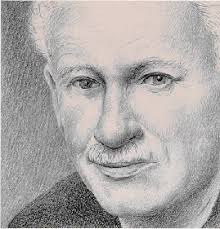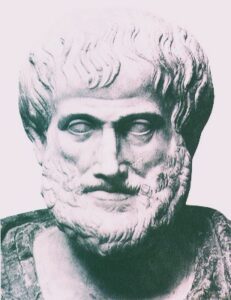In the 21st Century we are less likely to round up a hapless critter for a ritual “casting out” of guilt. Instead, we usually pick a plausible member of our own species and find a way to say they are not “us.”
[Rhetoric is preferable to violence. But rhetoric can be used to produce its own form of aggression. Scapegoating is near the tipping point where verbal acts become threatening. This feature of language is a burden every lover of words must carry. ]
Rhetorical victimage is a very common trope. Sometimes it only inflicts a minor wound on another, but it is more generally the language equipment of a demagogue ready to trade accuracy for advantage. You know the drill: If I can blame others, I’ll probably relieve some of the guilt I have for not performing better. The rhetorical forms of this victimage are everywhere, playing to simpler instincts to rebuke rather than include. Rhetoric is unfortunately the perfect tool for transferring responsibility for an unwanted outcome to less favored individuals or groups within a culture.
- “True, I flunked the course. But I had a lousy teacher.”
- “We’d be a good organization if only we had different leadership.”
- “The problem with our country is that it has too many illegal immigrants.”
The most egregious use of rhetorical victimage is in politics, where cultural outgroups are sometimes vilified to the advantage of an ingroup. It can be a verbal form that ignites fires of hate.
 Our 45th President was especially shameless at shifting the blame for our national woes to everyone but his followers. A sandwich of invective laced with lies is his thing. This may be a natural human habit we all have from time to time, but rarely has a national leader so consistently sought favor by rhetorically degrading others for the obvious benefit of excluding them from the tribe. The targets are as familiar as the overblown language: “the radical left,” the current president,” “the liberal media,” “recent immigrants,” and so on. Trump is one of a long line of American demagogues, from Huey Long to James Curley to Joseph McCarthy. The surprise to me after 45 years of studying political rhetoric is that the nation has not outgrown its love of political flamethrowers. Paraphrasing an insight from the Netflix’s series, The Diplomat (2023), perhaps it is not enough to be a decent person “in a time when decency has lost its hold on the public imagination.”
Our 45th President was especially shameless at shifting the blame for our national woes to everyone but his followers. A sandwich of invective laced with lies is his thing. This may be a natural human habit we all have from time to time, but rarely has a national leader so consistently sought favor by rhetorically degrading others for the obvious benefit of excluding them from the tribe. The targets are as familiar as the overblown language: “the radical left,” the current president,” “the liberal media,” “recent immigrants,” and so on. Trump is one of a long line of American demagogues, from Huey Long to James Curley to Joseph McCarthy. The surprise to me after 45 years of studying political rhetoric is that the nation has not outgrown its love of political flamethrowers. Paraphrasing an insight from the Netflix’s series, The Diplomat (2023), perhaps it is not enough to be a decent person “in a time when decency has lost its hold on the public imagination.”

The master-critic Kenneth Burke was a great observer of our communication routines, and never more so than when he described this “scapegoat principle.” For most of us working to understand why we say the things we do, this familiar rhetorical form offers the psychological benefits of transferring guilt to others.
Burke noted that groups or individuals face two options when a decision or action didn’t turn out as well as they wished. If we screwed up, we could accept responsibility and note with regret that our efforts failed to work out. He called this the “mortification” option, as in “I thought I could fix the bad feeling between Bill and Fred, but I think I just made it worse. I’m not very good at playing the role of mediator.” But doing this, of course, carries no obvious rewards, and requires a certain degree of grace and humility.
![]() So we usually opt for the second choice: we scapegoat the problem to others. It’s easier to blame Bill or Fred because doing so is an act of personal redemption. In this form our words are all too familiar: “Things are not going very well in my life right now and it’s her fault.” Like a fast-acting pill, the shifting of unwanted effects to others lifts us from the burdens of self-examination. In Burke’s language, we have “cast out” the problem. Perhaps this is why we have parents, pets, uncles, Republicans, socialists, and college professors. We can feel better when we believe that others are worse.
So we usually opt for the second choice: we scapegoat the problem to others. It’s easier to blame Bill or Fred because doing so is an act of personal redemption. In this form our words are all too familiar: “Things are not going very well in my life right now and it’s her fault.” Like a fast-acting pill, the shifting of unwanted effects to others lifts us from the burdens of self-examination. In Burke’s language, we have “cast out” the problem. Perhaps this is why we have parents, pets, uncles, Republicans, socialists, and college professors. We can feel better when we believe that others are worse.
Many groups have used sacrifices to purge the group of its problems. The most traditional victim was a four-legged animal that would be sacrificed to cleanse away problems usually caused by other humans. In the 21st Century we are less likely to round up a hapless critter for this ritual “casting out” of guilt. Instead, we usually pick a plausible member of our own species and simply lay on verbal condemnation. Think of Puritan purges of “witches,” Hollywood purges of communists, or internet trolls and their venom. For weak minds, anonymous comments online represent a perpetual Lourdes of guilt transference.
It would be nice if we could chalk up this human habit as but a small foible in the species. But the consequences of blaming others can’t be so easily dismissed. It’s worth remembering that Hitler’s murderous purge of supposed “non-Aryans” from German society—first with words and later with death camps–was fresh in Burke’s mind when he fleshed out the scapegoating principle.



